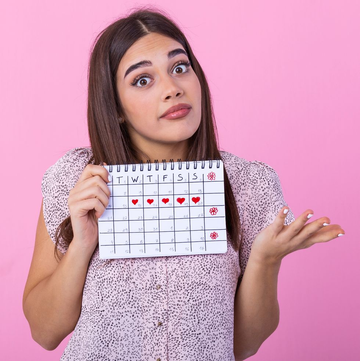It’s possible that keeping track of your monthly cycle isn’t even on your mind, but it should be. It can be done by period tracking . Because your period can reveal a lot about your overall health and well-being, it’s must be aware of any changes in your monthly cycle.
It’s simple to keep track of your period, and doing so can help you feel more in control of your period symptoms. Knowing when you’re having symptoms like cramping or anxiousness might help you provide the care your body needs.
Do you have a higher level of anxiety than usual? If you’re keeping track of your period, you may see a trend and be able to arrange some self-care on certain days. Do you have a breakout? If you’re keeping track of your period, pimple patches and clearing face treatments can help.
Let’s talk about how you may learn to track your monthly cycle and get more in tune with your body.
WHAT DOES A MONTHLY CYCLE MEAN?
Your monthly cycle encompasses more than simply your menstrual cycle. Your body goes through a cycle every 28 days that permits you to become pregnant if you want to.
This cycle is divided into four stages:
- Menstruation -This is the time when you get your menstruation. It normally lasts 5-7 days, although you may have shorter or longer periods based on your body’s natural cycle.
- Ovulation – When a developed egg is released from an ovary, this is known as fertilization. Although ovulation lasts only one day, your fertile window normally lasts a day before and after your expected ovulation date.
- Follicular -Your ovaries generate small follicles that contain immature eggs during this stage. This period starts on the first day of your period and ends when you ovulate.
- Luteal -The luteal phase begins after the mature egg is discharged. In the case of a pregnancy, progesterone and estrogen levels rise, and the lining of your uterus thickens to sustain a fertilized egg.
If you don’t get pregnant, your cycle will restart about two weeks following ovulation when you get your next period.
WHY IS IT IMPORTANT TO TRACK YOUR PERIOD?
If you aren’t trying to conceive, you may believe that keeping track of your period is just another duty that you don’t want to add to your to-do list. Your period, on the other hand, can reveal a lot about your health. Here are five reasons why you should keep a monthly period diary.
TRACKING YOUR PERIOD PROVIDES YOU WITH HEALTH INFORMATION.
A regular time between puberty and menopause indicates that your body is in good functional order. When something changes, it could be a sign of an underlying health problem, such as:
- Anemia
- Asthma
- Metal-related health problems
- Stroke and/or heart problems
- Problems with metabolism
- Problems with the bones
- Fertility problems
- Endometriosis
- Cysts in the ovaries
Changes in your flow, period length, cramping, or even your mood that are obvious and consistent should always be treated as a red flag to see your doctor.Don’t worry, most of the time it’s nothing serious, but it’s better to get checked just to be safe.
TRACKING YOUR PERIOD HELPS YOU GET PREGNANT OR AVOID BECOMING PREGNANT
Whether you want to have a kid or not, keeping track of your period might be beneficial. Keeping track of your menstruation can help you figure out when you’re most fertile. You can either try to get pregnant or take extra precautions to avoid getting pregnant once you know which days you’re most likely to ovulate.
Any time you have unprotected sex, you run the risk of becoming pregnant. Always use a contraceptive if you don’t intend to have a child.
TRACKING YOUR PERIOD CAN HELP YOU GET RID OF PERIOD SYMPTOMS.
Hormones have the ability to put you in a bad mood, especially when you aren’t expecting it. Period trackers allow you to know what to expect and when. You can keep note of symptoms such as:
- Mood swings, sometimes known as “PMS,” are a type of emotional change (anxiousness, sadness, happiness, irritability).
- Irritable bowel syndrome (IBS) with cramps.
- Bloating.
- Energy levels fluctuate.
- Breakouts.
- Increased sex drive.
These insights can assist you in taking better care of your body.
If you start cramping three days before your period, make sure you grab a soothing heating patch before you leave the house.
We believe that knowing what your body is doing and why makes you feel empowered, and knowing what your body is doing and why is undoubtedly empowering.It’s also a great method to ensure that you’re always conscious of what your body needs and that you’re looking after yourself throughout your cycle.
TRACKING YOUR PERIOD HELPS YOU KNOW WHEN YOU’VE ENTERED MENOPAUSE
The termination of menstruation is known as menopause. Natural menopause occurs in the majority of women between the ages of 40 and 58, with the average age of menopause being 51.
You won’t know you’re in menopause until you’ve gone twelve months without having a period. You may have “clusters” of periods leading up to menopause, with period-free months in between.
Because it’s difficult to recall when you last had a period if you don’t have one on a regular basis, you won’t know you’re in menopause until you track it.
RECORDING YOUR PERIOD ENSURES THAT YOU ARE READY.
We’ve all experienced the agony of starting our periods, bleeding profusely, and having no supplies on hand. When you track your period, you won’t have to go to the drugstore with a makeshift pad to get your period care items (and chocolate for your period cravings).
When you know your period is coming, you can quickly grab your favorite Bliss natural period care items to avoid leaks.
HOW DO YOU KEEP TRACK OF YOUR PERIOD?
You may easily and quickly chart your period using your iPhone or Google calendar, an Apple watch, a paper calendar, or a free cycle tracking health software. Regardless of interface, all trackers will effectively work the same way.
If you wish to keep track of your typical cycle on your own, simply follow the steps below.
- Keep track of when your menstruation begins. Today is the first day of your monthly cycle.
- Keep track of the beginning of your next monthly cycle.
- Count the days between the start day of your first menstruation and the last day before your next period. That period of time corresponds to the length of your monthly cycle, which is normally around 28 days.
- You’ll count backwards to determine your reproductive window. Ovulation happens 10 to 16 days before your period starts. The five to seven days surrounding ovulation are known as your reproductive window.
Every person’s body is different, and you may have monthly cycles that vary from two to three days each month. By following your period for three months, you can compute your average monthly cycle (how long it lasts).
Take the average of the number of days each monthly cycle lasted at the conclusion of three months. This is your month-to-month cycle.
Other factors, like your basal body temperature or the day of your last period, can help you align your calendar with your cycle for the most accurate period monitoring. If you use a period tracking app, you’ll be able to access this information at the touch of a button, with notifications and reminders appearing on your smartphone’s home screen.
TIPS AND TRICKS FOR TRACKING YOUR PERIOD
If you’re going to keep track of your period, you should also keep track of your period symptoms. This is where a period tracking app comes in handy.
Many applications come with preloaded symptoms that you can quickly include to your daily routine. A period tracking software can help you figure out tendencies like which days you’re more likely to experience specific emotions or period cramps after multiple cycles.
If you don’t want to use an app, you can keep track of your symptoms by writing them down on your calendar or saving them to your phone. After you’ve kept note of your symptoms for a few months, you can look for trends that will help you make predictions.
WHAT IF IT’S NOT PERFECT?
No one’s period is ever fully predictable. It’s very common to have a different monthly cycle or period duration from month to month. It’s also common to have a stronger or lower flow each month, as well as a wide range of period-related symptoms.
It’s a good idea to talk to your OB/GYN if you’ve missed a period completely, notice a shift that develops into a pattern (i.e. considerably heavier or lighter flow than normal), or are experiencing new period-related symptoms.
MESSAGE FROM BLISS PADS
Our calendars are packed, yet we can find time to pay attention to what’s going on with our bodies. We have greater health and less anxiety about period-related symptoms when we take better care of ourselves. While it’s crucial to see an obstetrics and gynecology MD on a regular basis, you may take control of your period tracking so you know what’s typical and when you should see your doctor.
Bliss naturals will help you deal with everything your body throws at you over the month. Our products are organic and natural to help keep you comfortable, confident, and protected all month long.
Shop our organic feminine products www. blisspads.com





